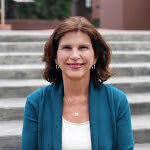An Interview with Terry Gaspard
 Terry Gaspard, MSW, LICSW is a licensed therapist, non-fiction writer, and college instructor with specialties in divorce, children, and families. She is a sought after speaker who frequently offers her commentary on divorce and her research on daughters of divorce. Two of Terry’s research studies on the long-term impact of parental divorce were published in the Journal of Divorce and Remarriage. Her third study of over 300 daughters of divorce examines relationship issues such as love, trust, and intimacy. Terry is a regular contributor to Huffington Post Divorce, divorcedmoms.com, and yourtango.com. Visit her at movingpastdivorce.com.
Terry Gaspard, MSW, LICSW is a licensed therapist, non-fiction writer, and college instructor with specialties in divorce, children, and families. She is a sought after speaker who frequently offers her commentary on divorce and her research on daughters of divorce. Two of Terry’s research studies on the long-term impact of parental divorce were published in the Journal of Divorce and Remarriage. Her third study of over 300 daughters of divorce examines relationship issues such as love, trust, and intimacy. Terry is a regular contributor to Huffington Post Divorce, divorcedmoms.com, and yourtango.com. Visit her at movingpastdivorce.com.
We would like to thank Terry Gaspard for taking the time to talk to Social Work Guide.
1. Why did you choose the field of social work rather than psychology counseling or another helping profession? What circumstances or influences led you to pursue a career as a social worker?
I was a reflective child and interested in helping others and social justice issues from an early age. My mother was a good role model for me because she was a public health nurse in Los Angeles who worked with at-risk teenagers. I was a natural counselor and problem solver and I worked as a peer helper/counselor in high school and college. In college, I worked as an advocate for women at a shelter for domestic violence victims. I earned an undergraduate and masters’ degree in psychology but felt unfulfilled in my jobs after graduation. However, after I decided to get my MSW, I became passionate about specializing in children, women issues, and families. Currently, I have a diverse practice which includes individual and group therapy, teaching at the college level, writing, and public speaking.
2. How has your career grown and developed over time?
It has developed as I’ve specialized in working with children, women, and families over three decades. At this time, I’m an author and blogger, I have a full-time practice as a licensed clinical social worker, and I teach at a community college. One of my specialty areas is divorce adjustment and this interest sprung up as a result of research I conducted while obtaining my MSW and gaining insight into my own issues as a result of being raised in a divorced family. Consequently, I’ve conducted three research studies on adult children of divorce and consider myself an expert on children’s issues, women, and divorce. My book Daughters of Divorce will be published by Sourcebooks in January of 2016 and I am a regular contributor to Huffington Post Divorce and a few other websites. I’m also the co-owner of a popular website about divorce and I conduct several seminars each year on the topic of divorce adjustment.
3. What do you see as the top social issues facing social workers today?
Poverty, gender inequality, violence, at-risk children and adolescents, divorce, family instability, and personal and financial stress.
4. What advice would you give to new social workers entering the field?
Work in the field before attending graduate school so that you can select a specialty area. Many social workers change jobs a lot because they don’t do this and they find less personal satisfaction as a result of job instability.
5. What are two or three top recommendations that can help social work graduates keep their skills current and continue learning after graduation?
Attend workshops regularly, read, conduct research, and collaborate with other professionals.
6. What is the key strength you bring to your career and what would you advise new graduates to mine their own strengths to further their careers?
Determination combined with a passion for my work. I advise new graduates to find a specialty area that you’re passionate about.
7. What can social worker students do to improve their competitive edge in the current job market?
Become a licensed independent social worker and obtain a lot of work experience in your specialty area.
8. Social work can be rewarding but challenging as well. What self-care strategies do you recommend for new social workers?
I exercise daily, write and read about two hours daily, spend time socializing with family and friends, and take four weeks of vacation each year.
9. Can you give an example of an interesting project or case that you have worked on and your role in helping to achieve a positive outcome?
I worked on a case of a single dad who wanted to improve his relationship with his two daughters after a bitter divorce. They mistrusted him and seemed to suffer resentment as a result of his disengagement in their lives as young children. As adolescents, they were unwilling to rebuild trust with him and refused to respond to his contacts. My role was to advise him and to facilitate better communication between him and his daughters and to begin to repair damage done from past parental neglect. After his divorce ten years ago, this father was estranged from his daughters and had an adversarial relationship with his ex-wife. But as a result of my interventions and his efforts, he went from feeling rejected by his daughters to being an active participant in their lives.
10. Is there any further advice you would share with students concerning social work as a career?
Keep actively involved in the field and research topics that interest you. Stay passionate about your interests and collaborate on-line and in person with other professionals who share your interests.
